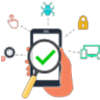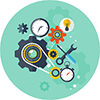Agile in Software Testing
Agile testing is software testing based on the principles of agile development. It is critical to develop and release new functions while maintaining their high quality in this competitive environment. Today, an increasing number of businesses are adopting the Agile development methodology. It emphasizes the rapid implementation and continuous authentication of the software's reliability and stability.
However, employing agile methodology without sufficient experience will not yield positive results; therefore, when selecting an Agile testing company, you must trust the skills acquired through the experience of QA engineers. QA Genesis has excellent experience working with clientele as an agile testing service company, utilizing traditional waterfall and agile methodologies.
Benefits Of Agile Testing
Improved time-to-market
Enhancing the product's quality and visibility
Productivity gains
Coordination between teams was improved
Reduced development costs
Risk mitigation
Empowering individuals to manage shifting priorities
Principles of Agile Testing
Accelerate your Quality Assurance Journey With Agile

Agile Testing Methodologies
QA Genesis offers Agile Testing Methodologies including:
Development Guided by Tests
Acceptance Development Guided by Tests
Development Oriented on Behavior
Frameworks and Solutions We Use
Web Testing Tools


TestRail

BrowserStack

Postman

SoapUI

Zephyr

Bugzilla

Jira
Mobile Testing Tools


Xamrin UI-Test

Frank

Espresso

Robotium

Selendroid (Android)
Functional Testing Tools


Ranorex

Selenium

QTP

JUnit

SoapUI

Watir

TestComplete
Performance Testing Tools


JMeter

Postman

Gatling

Neoload

Locust

Blazemeter
Popular Questions
1.What are the levels of Agile Testing?
Testing levels are described in completed documents in agile testing. They are conceptually equivalent to one another for optimum performance; thus, testing is not a distinct phase of the development process in the agile methodology, and all testing levels intertwine with one another.
2.What are the benefits of agile testing?
1. Savings in terms of time and money
2. Limits the amount of required documentation for compliance
3. Easy to respond to changes
4 Continually soliciting feedback from users
5. Resolving daily meeting concerns
3.How does QA work in an Agile environment?
While working in agile, the QA engineer collaborates with the development team, the owner, and other project team members to expedite the project's completion, not just by testing the software and identifying defects.
4.Do I need test cases in Agile?
Yes, you do. Agile demands test cases based on test scenarios.